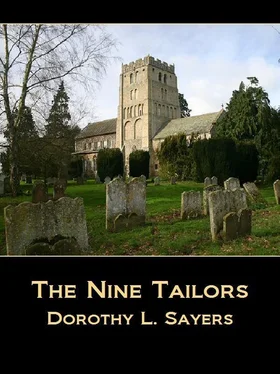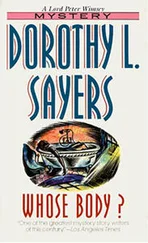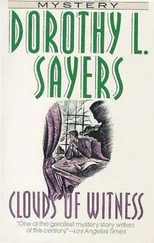Dorothy Sayers - The Nine Tailors
Здесь есть возможность читать онлайн «Dorothy Sayers - The Nine Tailors» весь текст электронной книги совершенно бесплатно (целиком полную версию без сокращений). В некоторых случаях можно слушать аудио, скачать через торрент в формате fb2 и присутствует краткое содержание. Жанр: Классический детектив, на английском языке. Описание произведения, (предисловие) а так же отзывы посетителей доступны на портале библиотеки ЛибКат.
- Название:The Nine Tailors
- Автор:
- Жанр:
- Год:неизвестен
- ISBN:нет данных
- Рейтинг книги:3 / 5. Голосов: 1
-
Избранное:Добавить в избранное
- Отзывы:
-
Ваша оценка:
- 60
- 1
- 2
- 3
- 4
- 5
The Nine Tailors: краткое содержание, описание и аннотация
Предлагаем к чтению аннотацию, описание, краткое содержание или предисловие (зависит от того, что написал сам автор книги «The Nine Tailors»). Если вы не нашли необходимую информацию о книге — напишите в комментариях, мы постараемся отыскать её.
The Nine Tailors — читать онлайн бесплатно полную книгу (весь текст) целиком
Ниже представлен текст книги, разбитый по страницам. Система сохранения места последней прочитанной страницы, позволяет с удобством читать онлайн бесплатно книгу «The Nine Tailors», без необходимости каждый раз заново искать на чём Вы остановились. Поставьте закладку, и сможете в любой момент перейти на страницу, на которой закончили чтение.
Интервал:
Закладка:
Over the Sunday beef and Yorkshire pudding, Wimsey tackled the Rector.
“How long ago was it, sir, that you took away the galleries from the aisles?”
“Let me see,” said Mr. Venables, “about ten years ago, I think. Yes, that is right. Ten years. Hideous, cumbersome things they were. They ran right across the aisle windows, obscuring all the upper tracery and blocking the light, and were attached to the arcading. As a matter of fact, what with those horrible great pews, like bathing machines, sprouting up from the floor, and the heavy galleries, you could scarcely see the shafts of the pillars at all.”
“Or anything else,” said his wife. “I always used to say it was regular blind man’s holiday underneath those galleries.”
“If you want to see what it was like,” added the Rector, “go and look at Upwell Church near Wisbech. You’ll find the same sort of gallery in the north aisle there (though ours was larger and uglier), and they have an angel roof, too, though not as fine as ours, because their angels are only attached to the roof itself, instead of being on the hammer-beams. In fact, you can’t see the angels in their north aisle at all, unless you climb up into the gallery.”
“I suppose there was the usual amount of opposition when you took the galleries down?”
“A certain amount, of course. There are always some people who oppose any change. But it did seem absurd, when the church was far too large for the parish in any case, to have all that unnecessary seating. There was plenty of room for the school-children in the aisle.”
“Did anybody sit in the gallery besides the schoolchildren?”
“Oh, yes. The Red House servants and a few of the oldest inhabitants, who had been there from time immemorial. Indeed, we really had to wait for one poor old soul to die before we embarked on the improvements. Poor old Mrs. Wilderspin, Ezra’s grandmother. She was ninety-seven and came regularly to church every Sunday, and it would have broken her heart to have turned her out.”
“Which side did the Red House servants sit?”
“At the west end of the south aisle. I never liked that, because one couldn’t see what they were doing, and sometimes their behaviour wasn’t as reverent as it might have been. I do not think the House of God is a proper place for flirtation, and there was so much nudging and giggling that it really was very unseemly.”
“If that woman Gates had done her duty and sat with the servants it would have been all right,” said Mrs. Venables, “but she was far too much of a lady. She always has to have her own seat, just inside the south door, for fear she should feel faint and have to go out. “
“Mrs. Gates is not a robust woman, my dear.”
“Rubbish!” said Mrs. Venables. “She eats too much and gets indigestion, that’s all.”
“Perhaps you are right, my dear.”
“I can’t stand the woman,” said Mrs. Venables. “The Thorpes ought to sell that place, but apparently they can’t under Sir Henry’s will. I don’t see how it can be kept up, and the money would be more use to Hilary Thorpe than that great tumble-down house. Poor little Hilary! If it hadn’t been for that horrible old Wilbraham creature and her necklace — I suppose there’s no hope of recovering the necklace, Lord Peter, after all this time?”
“I’m afraid we’re a day after the fair. Though I’m pretty sure it was in this parish up to last January.”
“In the parish? Where?”
“I think it was in the church,” said Wimsey. “That was a very powerful sermon of yours this morning, padre. Very inspiring. It inspired me to guess the riddle of the cryptogram.”
“No!” exclaimed the Rector. “How did it do that, I wonder?”
Wimsey explained.
“Good gracious! How very remarkable! We must investigate the place at once.”
“Not at once, Theodore.”
“Well, no, my dear, I didn’t mean to-day. I’m afraid it wouldn’t do to take ladders into the church on Sunday. We are still rather touchy here about the Fourth Commandment. Besides, I have the Children’s Service this afternoon and three baptisms, and Mrs. Edwards is coming to be churched. But, Lord Peter, how do you suppose the emeralds got up in the roof?”
“Why, I was just thinking about that. Isn’t it true that this fellow Deacon was arrested after church on Sunday morning? I expect he got some idea of what was going to happen to him, and concealed his loot somehow during the service.”
“Of course, he was sitting up there that morning. Now I understand why you asked so many questions about the gallery. What a sad villain the man must have been! He really did — what is that word they use when one malefactor deceives another?”
“Double-cross?” suggested Wimsey.
“Ah! that is the very expression I was looking for. He did double-cross his accomplice. Poor man! I mean the accomplice. Ten years in prison for a theft of which he never enjoyed the fruits. One cannot help feeling some sympathy for him. But in that case. Lord Peter, who constructed the cryptogram?”
“I think it must have been Deacon, because of the bell-ringing.”
“Ah, yes. And then he gave it to this other man, Legros. Why did he do that?”
“Probably as an inducement to Legros to help him to escape from Maidstone.”
“And Legros waited all these years before making use of it?”
“Legros obviously had very good reasons for keeping out of England. Eventually he must have passed the cryptogram on to somebody here — Cranton, perhaps. Possibly he couldn’t decipher it himself, and in any case he wanted Cranton’s help to get back from France.”
“I see. Then they found the emeralds and Cranton killed Legros. How sad it makes me to think of all this violence for the sake of a few stones!”
“It makes me still sadder to think of poor Hilary Thorpe and her father,” said Mrs. Venables. “You mean to say that while they needed that money so badly, the emeralds were hidden in the church all the time within a few feet of them?”
“I’m afraid so.”
“And where are they now? Has this man Cranton got them? Why hasn’t somebody found them by now? I can’t think what the police are doing.”
* * *
Sunday seemed an unusually long day. On the Monday morning, a great many things happened at once. The first thing was the arrival of Superintendent Blundell, in great excitement.
“We’ve got that letter from Maidstone,” he announced, “and whose do you suppose the writing is?”
“I’ve been thinking it over,” said Wimsey. “I think it must have been Deacon’s.”
“There!” said Mr. Blundell, disappointed. “Well, you’re quite right, my lord; it is.”
“It must be the original cipher,” said Wimsey. “When we found out that it had to do with bell-ringing, I realised that Deacon must be the author. To have two bell-ringing convicts in Maidstone Gaol at once seemed rather too much of a coincidence. And then, when I showed the paper to Mrs. Thoday, I felt sure that she recognised the writing. It might have meant that Legros had written to her, but it was still more likely that she knew it to be her husband’s.”
“Well, then, how did it come to be written on that foreign paper?”
“Foreign paper is much of a muchness,” said Wimsey. “Did Lady Thorpe ever have a foreign maid? Old Lady Thorpe, I mean.”
“Sir Charles had a French cook,” said the Superintendent.
“At the time of the theft?”
“Yes. She left them when the War broke out, I remember. She wanted to get back to her family, and they scraped her across on one of the last boats.”
“Then that’s clear enough. Deacon invented his cryptogram before he actually hid the emeralds. He couldn’t have taken it into prison with him. He must have handed it to somebody—”
Читать дальшеИнтервал:
Закладка:
Похожие книги на «The Nine Tailors»
Представляем Вашему вниманию похожие книги на «The Nine Tailors» списком для выбора. Мы отобрали схожую по названию и смыслу литературу в надежде предоставить читателям больше вариантов отыскать новые, интересные, ещё непрочитанные произведения.
Обсуждение, отзывы о книге «The Nine Tailors» и просто собственные мнения читателей. Оставьте ваши комментарии, напишите, что Вы думаете о произведении, его смысле или главных героях. Укажите что конкретно понравилось, а что нет, и почему Вы так считаете.












